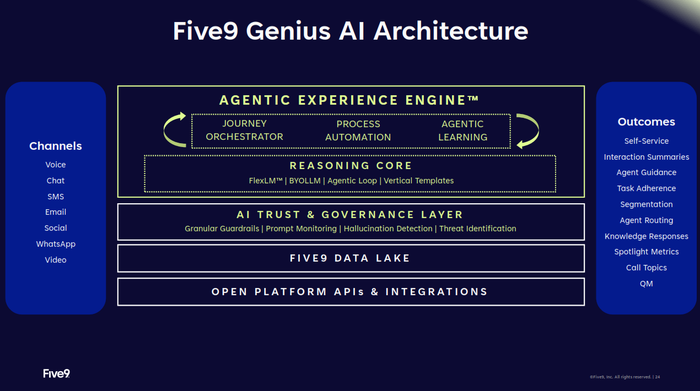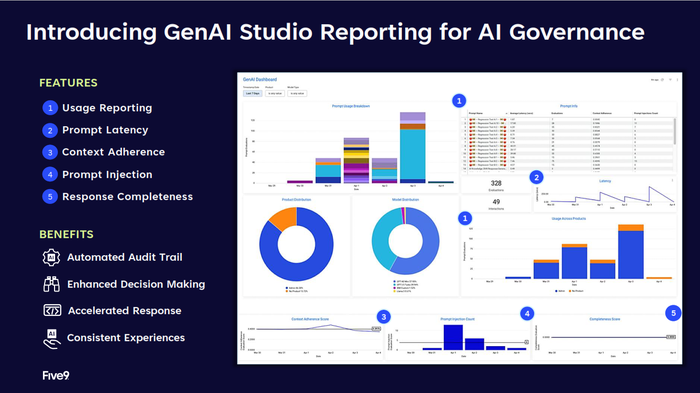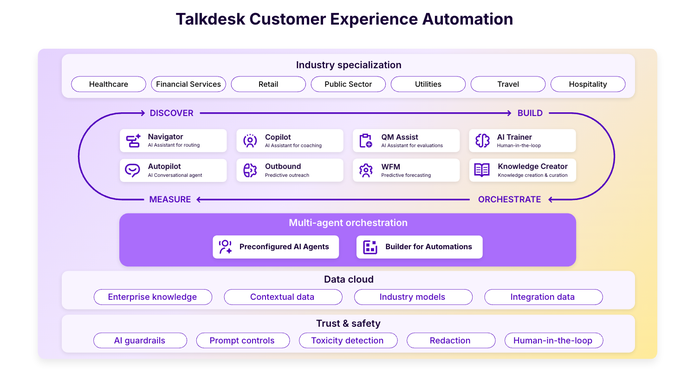AI Agents Are All the Buzz at CCW and Cisco LiveAI Agents Are All the Buzz at CCW and Cisco Live
Cisco, Five9 and Talkdesk announce solutions for automation of end-to-end CX journeys.
June 12, 2025

Two conferences with customer experience content are taking place this week: CCW Vegas and Cisco Live US in San Diego. In conjunction with these events, three companies in the contact center/customer experience market offered me pre-briefings: Cisco, Five9 and Talkdesk. As seen in the now-released press releases or announcement blog titles, each company puts a major focus on AI agents and the automation of customer service.
Cisco Webex AI Agent: Introducing pre-built templates for faster AI-powered customer service deployment.
Five9 Launches Agentic CX with AI Agents that can Reason, Decide, and Take Action.
Talkdesk Shatters outdated customer experience paradigm with launch of Customer Experience Automation (CXA) platform.
Cisco Webex
Webex AI Agent general availability was announced at Enterprise Connect 2025. This week’s announcement expands the solution to include pre-built templates for creation of autonomous, industry-specific use cases. These include package tracking for retail, appointment scheduling for healthcare, banking and airline templates, with more to come. In addition, AI Agent and AI Assistant are now available for on-premises customers of Cisco Contact Center Enterprise (CCE) with general availability of CCE 15.
Webex AI Agent is just one element in a broad One Cisco go-to-market strategy. One Cisco’s goal is to position its entire portfolio of products and solutions, including networking, security, observability, and collaboration, to address customer priorities for AI-ready data centers, future-proofed workplaces, and digital resilience. The Cisco collaboration and Webex portfolios, of which Webex AI Agent is a part, seek to deliver workplace transformation with AI technology that takes advantage of broader, Cisco-wide, AI investments.
Jay Patel, senior vice president and general manager, Webex Customer Experience Solutions, Cisco, said during the pre-briefing, “We [Webex CX] benefit from the underlying Cisco platform. We are talking about systems of AI, not point solutions for AI.” He said that CIOs are going to think very carefully about the AI vendors they deploy for each application in their organization. The value proposition of One Cisco is to encourage clients to work with vendors that can manage a significant portion of their hardware and software infrastructure.
Today’s One Cisco strategy is evocative of the company’s path to dominance in unified communications and contact center in the 2000s and 2010s. Then, UC and contact center were sold as part of larger data networking deals. Cisco described for analysts a recent 9-digit deal with a global airline where Webex Customer Experience solutions comprised 20 percent of the total deal.
For Cisco, end-to-end journey management is across the organization – from the data center to the contact center.
Five9
Five9 AI Agents, which mark the expansion of the Five9 Genius AI suite with agents that incorporate generative AI, were announced in November 2024 at the Five9 CX Summit in Barcelona. Like the Cisco announcement discussed above, Five9’s CCW news marks the general availability of the AI Agents along with new tools to aid customers as they deploy AI Agents.
As part of the Reasoning Core in the Genus AI architecture, shown below, Five9 is delivering pre-built templates that ship with Five9 GenAI Studio. A financial services agent template is included in the initial launch, but Jonathan Rosenberg, CTO and Head of AI, Five9, explained during the pre-briefing that, “we will have an ongoing process to add more” templates as customers drive demand for new use cases.

Five9
Rosenberg explained that templates include detailed “mega-prompts” that define the agent’s persona, memory, conversational guidelines, guardrails, languages, data usage, and tone. Customers can import a template and easily customize it for their own needs, dramatically reducing the time and cost of implementation compared to traditional, fully custom AI builds.
“It used to be [that] bot development was almost all custom, and you had high implementation cost. Now, with templates, we are turning the knob significantly, so there is a lot more reuse,” Rosenberg expanded.
Another noteworthy aspect of Five9’s CCW news is the new reporting capabilities for AI Trust & Governance. Gen AI Studio Reporting for AI Governance is designed to give organizations granular visibility into how AI models are performing, specifically to ensure that these systems operate within defined guardrails and deliver reliable, safe, and compliant outcomes.
To highlight just one of the features below, context adherence – also referred to as hallucination detection – tracks when an AI model generates responses that are not based on the provided input or knowledge. Even if the information is correct, if it was not derived from the prompt or context, it is flagged as a problem. This helps ensure the AI only uses authorized data and instructions, supporting compliance and reducing risk.
For Five9, end-to-end journey management means creating tools to allow companies to build AI automation, from design to delivery with appropriate guardrails.

Five9
Talkdesk
The power of Talkdesk’s CXA comes within the context of the entire Talkdesk CX Cloud. CXA would not be possible without pieces of the broader platform Talkdesk has built over time. In the graphic below, the unique elements of the CXA are highlighted in dark purple: preconfigured AI Agents and Builder for Automations. Builder for Automations is an extension of Talkdesk’s existing build tool and is the design and orchestration environment for CXA. The Data Cloud CXA relies on the trust and security solutions available to it and the applications AI agents can work with – e.g., Autopilot, Outbound, Copilot, are all existing Talkdesk CX Cloud elements.

Talkdesk
Re-using CX platform elements is not exclusive to Talkdesk. Crystal Miceli, senior vice president, product and industry marketing, Talkdesk, believes CXA goes further. “It goes truly into multi-agent orchestration, so multiple agents running simultaneously to solve problems under centralized orchestration, all configurable within the platform with just prompting instead of actual coding,” said Miceli in the briefing. “We think we actually have something that's pretty unique,” she concluded.
The Talkdesk Customer Experience Automation (CXA) platform includes both general-purpose and industry-specialized AI agents, allowing organizations to automate workflows that are unique to sectors that include healthcare, financial services, retail, utilities, travel, and government. Talkdesk CXA is generally available as of June 2025, with existing customers already using it and new customers able to purchase and deploy it immediately.
Talkdesk ambitiously defines end-to-end to mean creating tools to allow companies to build AI automation, from design to delivery with appropriate guardrails.
Are You Ready for AI Agents?
The definition of AI Agent varies across vendors but generally refers to conversational AI automation using generative AI, both text and voice. Another characteristic of AI Agents is the ability to autonomously complete tasks. For example, an autonomous AI travel agent could search for flights, compare hotel options, check weather conditions, and book reservations – adjusting its plan if a flight is full or a hotel is unavailable, all without human guidance after the initial request.
Some use the term agentic agent synonymously with autonomous though there is a difference, albeit a subjective one. Agentic AI should be applied where AI systems possess higher degrees of autonomy, adaptability, and goal-driven behavior. They would also anticipate needs and take initiative.
I would argue that a relatively small percentage of contact center customers today have deployed AI in production deployments. Think of the percentages below as SWAGs.
Using conversational AI: 15% of organizations.
Deploying AI agents for limited use cases: less than 3%.
Deploying agentic AI for limited use cases: less than ½ of a percent.
While AI technology is moving at a rapid pace, contact center technology adoption is historically slow. This is especially true of technology deployed in customer-facing use cases. I would not disagree that the use of AI for interaction summarization is soaring – but the risks of using AI are less dire when used internally with a human in the loop. Certainly, many organizations are conducting proof of concepts or trialing deployment of AI agents, but adoption remains slower than the advancement of technology.
Will companies leapfrog automation technology, e.g., from an IVR environment to AI agents? Perhaps. I’m more inclined to believe there are a small number of innovative companies that have ridden the technology curve – perhaps from conversational AI to AI agents – that will be the first to use agentic AI.
About the Author
You May Also Like





